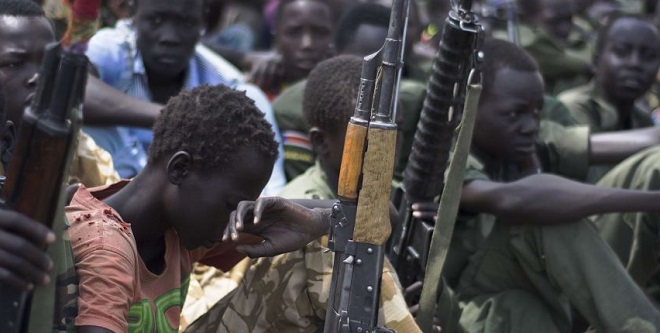
Nairobi, Kenya | AFP |
New militia groups, some “opportunists”, others “downright criminal”, have emerged in South Sudan since renewed violence erupted there last July, the head of an international ceasefire monitoring team said Friday.
Talking to the press in Nairobi, Festus Mogae, a former president of Botswana who leads the Joint Monitoring and Evaluation Commission (JMEC), said these new rebel groups “did not exist before.”
He also expressed fears of renewed ethnic violence.
Mogae said the new militias formed after violent clashes broke out in the region of the capital Juba, forcing more than 10,000 people to seek refuge at a UN base at the time.
“Some are opportunists, others are downright criminals, because of the shortage of food,” Mogae said. “There are allegations that some groups are targeting Dinkas.”
War broke out in South Sudan in December 2013, pitting the country’s majority Dinka tribe of President Salva Kiir against his former vice-president Riek Machar and his Nuer tribe supporters.
Observers said it later metastasised with other tribes joining one side or the other, often with the hope of getting an upper hand in local conflicts over land and other issues.
A peace agreement signed two and a half years later raised hopes of an end to the conflict, but the deal’s implementation lasted just over two months.
“The government of national unity is functioning with inadequate representation,” Mogae said. “The government has to be more inclusive. It must include more of Riek Machar’s people.”
After its outbreak in Juba, the war was largely restricted to the northern states of Unity, Upper Nile and Jonglei but in the past six months it has expanded into the southern Equatoria region surrounding Juba.
Ethnic killings also intensified, particularly in and around the southern town of Yei, pushing tens of thousands of people to seek refuge in neighbouring Uganda.
Dinka troops were accused of driving the atrocities, which drew the attention of the international community. It led UN experts in early December to report “ethnic cleansing” in several parts of South Sudan.
On Friday, Mogae described a complicated network of rebel groups with different agendas joining the conflict, evidence of the complexity of the civil war in South Sudan.
Some of the groups, said Mogae, are driven by revenge along ethnic lines, others feel marginalised and excluded by the peace deal, which largely brought together Kiir’s Dinkas and Machar’s Nuers.
The rest are simply criminals, he added, intent on looting humanitarian aid.
“This is why we are saying to the government: do something,” Mogae said. “These people are nationals. The people of Equatoria are South Sudanese, they have legitimate grievances that the government must address.”
South Sudan gained independence in 2011, but the conflict escalated into a humanitarian crisis where more than six million people — half of South Sudan’s population — are in need of urgent aid, the United Nations has reported.
Humanitarian organisations expect this number to rise by 20 to 30 percent in 2017.
 The Independent Uganda: You get the Truth we Pay the Price
The Independent Uganda: You get the Truth we Pay the Price



